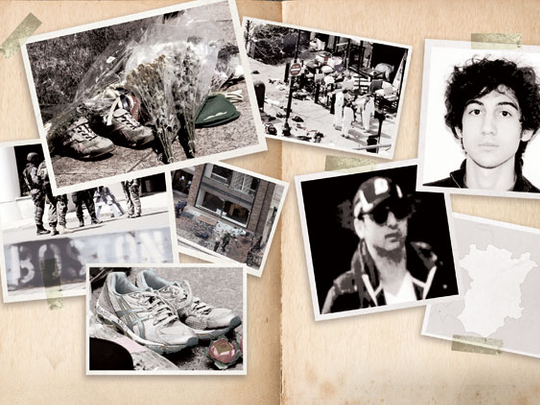
There is much that we do not yet know about Dzhokhar — who was arrested following a massive manhunt — and Tamerlan Tsarnaev, the suspects in the Boston Marathon bombings. However, one thing we do know is that they come from the Russian republic of Chechnya and that the family probably fled their homeland after war broke out in 1994. Although that war began as a movement for Chechen sovereignty and independence, it escalated into two extraordinarily bloody, messy, vicious armed conflicts, during which, hundreds of thousands of people were killed. Grozny, the Chechen capital, was thoroughly destroyed. Photographs taken there after the end of the war look eerily old-fashioned — as though they were from 1945 Warsaw or Dresden.
One brother was born in Kyrgyzstan, a former Soviet republic, and it is not odd that both later went to school in Dagestan, another Russian republic. They were both refugees. Nor is it strange that the brothers were speaking and posting to social media sites in Russian, which is still the dominant language in much of the post-Soviet world. For the record, there are many Russian Muslims and many Chechens living in ethnically Russian Russia and it will not be surprising if there are many Chechens living in ethnically Kyrgyz Kyrgyzstan as well. The Soviet Union was a multinational, multiethnic, multireligious state. Much of the post-Soviet world remains equally if sometimes uncomfortably mixed.
What seems exotic to Americans, in other words, could prove to be a fairly common story: A Chechen family flees terrible violence, moves around the former Soviet Union for a few years, finally strikes it lucky and ends up in the US. They have been in the US for a decade. The brothers went to high school in Boston. One was an amateur boxing champion, the other a freshman at the University of Massachusetts Dartmouth.
However, something went terribly wrong and perhaps that ‘something’ had to do with Chechnya. The two bloody Chechen wars caused incredible damage — the 26-year-old older brother, who died after a shootout with the police early on Friday, may well have remembered the violence and inspired an equally bloody terrorist movement. Once a largely secular population, some Chechens became radicalised after losing their homes, friends and families. Highlights of Chechen terrorism include the violent storming of a Moscow theatre, attacks by several female suicide bombers and the bombing of a Moscow airport. Worst of all was the 2004 siege of a primary school in the city of Beslan, a disaster that ended with the deaths of hundreds of parents and children. The nihilism and cruelty of Chechen terrorists — who have often targeted innocent bystanders — seem to have an echo in the horribly random Boston bombings.
One or both of the brothers might well have been in touch with Chechen separatists, whose website they were reportedly reading. They could even have been in touch with the Al Qaida. However, I would not jump to that conclusion. Chechen terrorists have, in the past, been more anti-Russian than pro-Islam. They were never anti-American and they were not known to have acted outside Russia. They have only the weakest of links to other international terrorist organisations.
Look, instead, at another possibility — one that is in some ways more disturbing than the convenient “foreigners who hate us” explanation. Although very little has been confirmed, the behaviour of the Tsarnaev brothers looks less like that of hardened, trained terrorists and far more closely resembles the second-generation European Muslims who have staged bombings in Madrid, London and other European cities. Educated and brought up in Europe, these young men nevertheless felt out of place in Europe.
Unable to integrate, some turned towards a half-remembered, half-mythological homeland in search of a firmer, fiercer identity. Often they did so with the help of a radical cleric like the one the Tsarnaev brothers may have known. “I don’t have a single American friend,” Tamerlan Tsarnaev reportedly said of himself. That’s the kind of statement that might have been made by a young Pakistani living in Coventry, or a young Algerian living in Paris.
America does not expect to hear it from someone who grew up in Boston, a city that has taught generations of foreigners to become Americans in a country that likes to think of itself as a melting pot. However, now it may be time for Americans to change their expectations. These terrorists are a lot less like the 9/11 attackers and a lot more like the men known as the Tube bombers of London or the train bombers of Spain.
America’s response is going to have to be different — very different — as well.
— Washington Post
Anne Applebaum is a weekly columnist for the Post, writing on foreign affairs.









